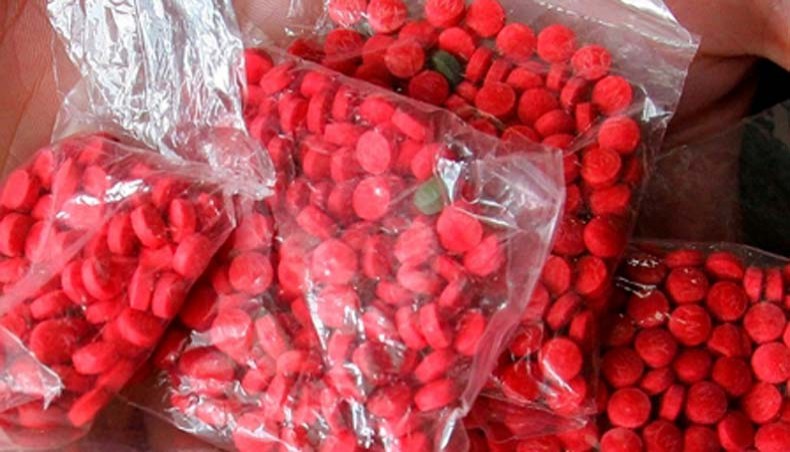Death for possessing 5 grams of Yaba
The cabinet on Monday approved in principle the Narcotics Control Bill proposing death penalty as the highest punishment for dealing Yaba over five grams.
The capital punishment was also proposed for dealing heroin or cocaine beyond the amount of 25 grams, according to the bill the security services division placed before the weekly cabinet meeting at the Prime Minister’s Office.
When asked a Rapid Action Battalion media and legal wing official said that 50 Yaba tablets weigh five grams.
Jurists and rights activists expressed fears that ordinary folks could be harassed by law enforcement agencies using the proposed law.
Rights campaigners said that they often heard complaints that common folks were harassed by police and other law enforcement personnel by stuffing drugs in their bags or pockets.
If enacted, the bill would repeal the Narcotics Control Act 1990 incorporating provisions on Yaba and Shisha Bar and dope test, cabinet secretary Mohammad Shafiul Alam said at a briefing at secretariat after the meeting.
He said that any person would be sentenced to death or life term imprisonment for possessing Yaba tablets weighing more than five grams. Any individual may be jailed for 1–5 years for possessing Yaba below five grams.
Of different types of drugs, hemp, Yaba, Phensedyl and alcohol are the most used items by the addicts in Bangladesh, narcotics control officials said, adding that Yaba was smuggled in from Myanmar while Phensedyl from India.
Against the backdrop of widespread use of drugs, Yaba in particular, the Rapid Action Battalion at the direction of prime minister Sheikh Hasina began nationwide anti-drug drive on May 4 while the police launched massive drives on May 18.
At least 249 suspected drug peddlers, mostly reported Yaba dealers, have so far been killed in reported ‘gunfights’ with law enforcement agencies or their ‘rivals’ and 40,000 were arrested in the anti-drug drives.
Any dealing, like selling, carrying, possessing, smuggling or using, of Yaba would be a punishable offence to check spread of Yaba tablets, the cabinet secretary said.
Jurists and rights activists expressed fears that ordinary folks could be harassed by law enforcement agencies using the proposed law as allegations had it that law enforcers harassed people by stuffing drugs in their bags or pockets.
Prescription of harsh punishments for Yaba possession would multiply the possibility of harassing ordinary people by the law enforcement agencies, they said.
They criticised the government for creating greater scope of corruption by the law enforcement agencies.
Yaba, a banned drugs made of methamphetamine, is smuggled into Bangladesh from neighbouring Myanmar though it damages the nervous system of its addicts.
According the Department of Narcotics Control’s assumption the country’s Yaba addicts outnumber other addicts.
‘This is a typical case of unpopular government taking recourse to harsh punishment for a minor offence. Such harsh punishment will result in more corruption in law enforcement agencies,’ said senior Supreme Court lawyer Shahdeen Malik.
‘We often get the allegation that law enforcement agencies harass people by pouring drugs in their pockets or bags. And Yaba which can be carried easily can be poured in anyone’s pocket easily,’ Rights organization Ain o Salish Kendra executive director Sheepa Hafiza told New Age.
Asked about the scope of misuse of the proposed law, home minister Asaduzzaman Khan said that none of police or any other law enforcement agencies would be spared if anyone was harassed. Measures would be taken to check misuse of the law, he added.
Addiction of Yaba has become a major concern in society, said officials justifying the tough provisions to check the menace.
The bill proposed death penalty or life term for keeping in possession, carrying, selling or using heroin or cocaine weighing over 25 grams, said Shafiul, adding that anyone would be jailed for 2–10 years dealing these drugs below the amount.
He said that the provisions of fine against the offences were also proposed in the bill.
As per the bill, it would require licences to run ‘Shisha Bars’, where some kinds of herbs with dried fruits are served for smoking.
If anyone was found positive in dope test, he/she would be jailed for minimum six months and maximum five years.
The cabinet gave the final approval to the Bangladesh Labour (Amendment) Bill and the Bangladesh Technical Education Board Bill.
It also congratulated Bangladesh under-18 national women’s football team for clinching the title of SAFF U-18 Women’s Championship in Bhutan.
On September 3, the cabinet approved in principle the Bangladesh Labour (Amendment) Bill 2018 to make harsher provisions against child labour in any industry and allow ‘light work’ for teens belonging to 14–18 age group.
The bill proposed reduction of the workers’ representation to 20 per cent from the existing 30 required for forming a union at a factory following recommendations of the International Labour Organisation.
News Courtesy: www.newagebd.net











